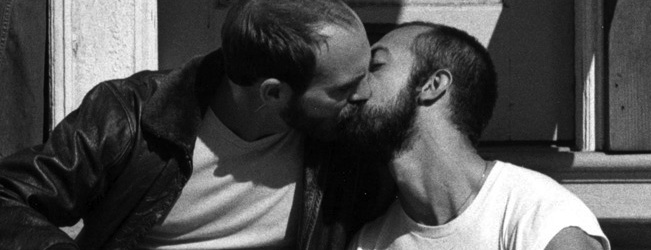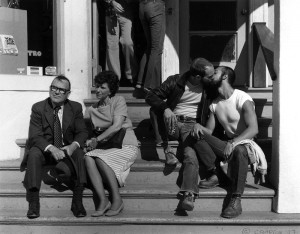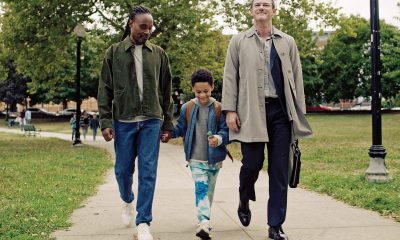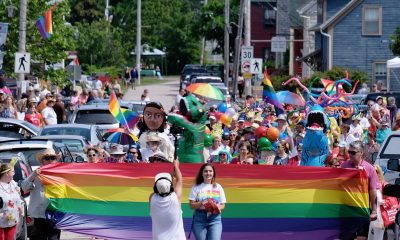Living
Castro catastrophe
‘We Were Here’ offers first-hand accounts of AIDS horrors in San Francisco


A vintage still from San Francisco's Castro neighborhood used in 'We Were Here.' (Photo courtesy of Film Collaborative)
There were angels in San Francisco.
But unlike in Tony Kushner’s two-part Pulitzer-Prize-winning play about AIDS — “Angels in America,” set in New York City in the mid-1980s — these angels were real people.
In the Kushner play, an angel descends to earth, as his fictional characters struggled with this unsettling new disease, the “gay cancer” as it was being called, an epidemic that seemed to spring from nowhere and then spread like a wicked wildfire.
In San Francisco it also struck like a bolt from the blue and purple unknown, its stigmata the purple-ish and dark reddish-blue marks of skin lesions — those herpes-like, cancerous tumors of Kaposi’s sarcoma — that began to dot faces and limbs and torsos with an ugliness that was unmistakable and the cause unknown. Right-wing televangelist Jerry Falwell called the lesions, which were seen as the defining illnesses of AIDS in the 1980s, to be the signs of Satan’s claim over sins of the flesh and God’s punishment for those same-sex sins, demons of a heaven-sent plague upon homosexuality.
“For a group of gay men, so into physical appearance, this was a disease whose very physical manifestations were horrifying,” says Daniel, one of the five people profiled in a new and deeply affecting documentary film, “We Were Here,” a gut-punch of a feature-length film by producer-director David Weissman, about the coming of AIDS to the Bay Area, and the human havoc it wrought.
This film is truly a moving picture. Co-presented with Reel Affirmations, as part of the 25th Annual FilmFest D.C. (now through April 17), it is playing tonight and Saturday night at the Regal Cinemas Gallery Place, on 7th Street, N.W., near Verizon Center. Each showing is at 6:30 p.m. followed by town meetings to discuss the film and its ramifications today in D.C. where the disease still flourishes.
Each one of the five in “We Were Here” is a witness, a survivor, and haunted in some indelible way by what they saw. Four of them are gay men (Daniel, Ed, Guy and Paul), who each contracted HIV yet somehow survived. One is a straight woman (Eileen) who ministered to the patients, as a nurse who cared about them as human beings, not clinical case studies.
Like Eileen, who appears to be a modern-day Florence Nightingale, each one is an angel, each able to say, “we were here.” Each is a survivor of the mysterious epidemic that moved through San Francisco in the 1980s with all the ferocity of an avenging angel, a grim reaper carrying off those who had sown such pleasure, but now so many of them faced death as a result.
Each is an eyewitness. At the skillful hand of filmmaker Weissman, who also earlier produced “The Cockettes,” a documentary about the campier side of the Bay Area, the testimony of the five is heartfelt and eloquent, bringing the kind of emotion that only those who experienced it first hand can bring.
Daniel’s voice is such an example. His voice is riveting, his gaze impossible to turn away from. He’s a modern-day Ancient Mariner come to tell us of how wrong things can get when bad things happen to good people.
He recalls that tragic time when no one could comprehend what was happening, as the virus burned its way through the carefree, almost heedless hedonism that came to the Bay Area after Stonewall in 1969, when hippies flocked to the Haight Ashbury and gays to the Castro. For a time all was well. But it was the sexual romp before the gathering storm.
Paul, who found his early calling in political action working with Harvey Milk, says, “I came to San Francisco with nothing but my backpack and my boyfriend.” He recalls that in the mid-1970s, “I believed that at that time in San Francisco there were nothing but crazy dreamers.”
Daniel went, recalling that, “I always wanted to meet a blond surfer but I was still in the closet, but then I came out with a bang,” in part spurred by being cast in the gay-themed play “The Boys in the Band.”
One observer, appearing in the film, puts it bluntly about that era: “If you took a lot of young gay men and asked them, ‘How much sex would you like to have?,’ the answer was, ‘A lot,’ and the sense was, sex is good, and more sex is good,” and after all, he adds, “We came to San Francisco to be gay.” Ed, who moved to the city in 1981, is equally blunt: “I was always in relationships, but they were open … My sexual outlet was always the bath houses and it was fun.”
But times were changing. In 1979, Harvey Milk was assassinated. In 1980, Ronald Reagan was elected president. The hopes and dreams of hippie hedonism didn’t last. But then, says Weissman, who documents it with clinical detail from archival footage, signs of trouble began to appear.
“People were wasting, losing so much weight, [San Francisco’s Castro neighborhood] looked like a concentration camp,” says Daniel. “You almost had to turn away, it was just too scary.” He felt haggard and haunted: “I was losing all the fat in my face and my butt — I would walk by a store window and jump, ‘Who was that?’ — I was skin and bones.”
At times death came with startling swiftness. Eileen, who chose to care for AIDS sufferers and then to work on clinical trials seeking pharmaceutical relief of the worst symptoms, says that in the hospital where she worked, “People were coming in with a KS lesion one day and were dead 10 days later.” Her own heart went out to them, but others shrank away in fear and ignorance, as some voices were raised calling for tattoos to be stenciled onto all persons diagnosed with HIV and some even called for packing them away into leper-like colonies.
“From the beginning,” she says, “I just couldn’t understand the homophobia that was going on and the fear of going into the [hospital] rooms.”
“There was nothing that unusual in that people are of course going to die,” says Ed, who speaks like a creative writer, a craft in which he earned a graduate degree. But in San Francisco, he says, “It’s just that it happened in a targeted community, to people who were disenfranchised, separated from their families.” But then a kind of miracle happened when people like Eileen stepped forward, as well as gay men who were not infected. In Ed’s words, “A whole different group of people stepped up and became their families.”
They got involved. Eileen joined ACT UP. Daniel fought his way back from depression and worked on the Names Project, which made the AIDS quilt.
Each of five was chosen, says Weissman, because they had a special story to tell, and the film delivers what they have to say with an emotional wallop. But more than that, he admits, “The city is also a character” in the film, which he calls “Very personal to me” and “a love letter to San Francisco,” where after some years living in Portland, Ore., he is now based. A commercial release is planned for later in the year.
Weissman, who is gay, was born in 1954 in Los Angeles, and never went to college, he explains, because he “lived through the hippie times.” He got into filmmaking in his late 20s. He says it was “something on the spur of the moment.” He took coursework at the City College of San Francisco, but says at first he never thought of himself as a documentarian. Instead, he produced a series of short comedies until finally, after “a moment of unexpected inspiration,” he made the 2001 acclaimed documentary, “The Cockettes,” about the Bay Area’s legendary theater troupe of hippies and drag queens.
“Some people worry that seeing a film like this will be a downer,” Weissman says. “But that’s definitely not the case. Instead, it’s a cathartic experience, healing and empowering.”
“Especially for young gay men today, who don’t know very much about our history,” Weissman says the film opens “a window about how we got where we are today, and the resilience our community has shown in the face of terrible adversity.”
Other gay-themed films slated for fest
The Washington, D.C. 25th annual international film festival event comes alive this week overflowing the Historic Lincoln Theatre on U Street, AMC Mazza Gallerie, Regal Gallery Place at Verizon Center on 7th Street N.W., the Landmark E Street Cinemas, the Avalon and other venues through April 17.
“We know for sure that people in D.C. are interested in films other than Hollywood films,” says Tony Gittens, who founded the festival in 1987.
Themes include “Justice Matters,” a cluster of films focusing on social justice issues; Global Rhythms, a special section of music films; Short Cuts, eight films less than feature length from around the world; and “Lunafest,” nearly 90 minutes of short films for, by and about women. Tickets for most films are $11, he says, and shows tend to sell out, so buying tickets online is the smart bet.
For a complete list of films and events, which include “freebies” for children and seniors, and to purchase tickets, visit filmfestdc.org or call 888-996-4774 from 10 a.m.-6 p.m. Monday through Friday and from noon-5 p.m. on weekends. Tickets may also be purchased at the theater on the day of the show, with the box office opening one hour before the venue’s first screening of the day.
In addition to “We Were Here,” three others have LGBT appeal:
“Circumstance” (“Sharayet”) in Persian with English subtitles 9 p.m. tonight and 6 p.m. Saturday at Regal Cinemas Gallery Place. Directed by Maryam Keshavasrz, this joint French-Iranian-USA production won this year’s Sundance Film Festival audience award. A young Iranian girl, still in her teens, Atafeh, and her best friend Shireen, experiment with mutual sexual attraction amid the subculture of Tehran’s underground art scene and face familial disapproval.
“For 80 Days” (“80 egunean”) in Spanish with English subtitles co-presented with the Embassy of Spain at 7:30 p.m. Sunday and 8:30 p.m. Monday at the Avalon Theatre, 5612 Connecticut Ave. N.W. Directed by Jon Garano and Jose Maria Goenaga, this Spanish entry depicts two women, one of them lesbian, who were best friends in youth, who meet again by accident 50 years later.
“Loose Cannons” (“Mine Vaganti”) in Italian with English subtitles screens at 9 p.m. tonight and 7 p.m. Saturday at AMC Mazza Gallery, 5300 Wisconsin Ave. N.W.
Directed by Ferzan Ozpetek, the films depicts a large, eccentric family whose patriarch puts pressure on the two sons, who are gay, to follow in the family business.

As the days grow longer and buyers re-emerge from winter hibernation, the spring market consistently proves to be one of the strongest times of year to sell a home. Increased inventory, motivated buyers, and picture-perfect curb appeal make it a prime window for homeowners ready to list.
The good news? Preparing your home for spring doesn’t require a full renovation or a contractor on speed dial. A few thoughtful, cost-effective updates can dramatically elevate your home’s appeal and market value.
Here are smart, inexpensive ways to get your property market-ready:
Fresh Paint: The Highest Return on a Small Investment
Few improvements transform a home as quickly and affordably as paint. Neutral tones remain the gold standard, but today’s buyers are gravitating toward warmer tan hues that create an inviting, elevated feel without overwhelming a space. Soft sandy beiges and warm greige-leaning tans provide a clean backdrop that photographs beautifully and allows buyers to envision their own furnishings in the home.
Freshly painted walls signal care and maintenance — two qualities buyers subconsciously look for when touring properties.
Removable Wallpaper: Style Without Commitment
For homeowners wanting to introduce personality without permanence, removable wallpaper offers a stylish solution. A subtle textured pattern in a powder room, a soft botanical print in a bedroom, or a modern geometric accent wall can add depth and character. Because it’s easily removed, it appeals to both sellers and buyers — creating visual interest without long-term risk.
Upgrade Light Fixtures for Instant Modernization
Outdated lighting can age a home instantly. Swapping builder-grade fixtures for modern, streamlined options is one of the simplest ways to refresh a space. Consider warm metallic finishes or matte black accents to create a cohesive, updated look. Proper lighting not only enhances aesthetics but also ensures your home feels bright and welcoming during showings.
Elevate Curb Appeal: First Impressions Matter Most
Spring buyers often decide how they feel about a home before they ever step inside. Refreshing curb appeal doesn’t require major landscaping. Simple updates such as fresh mulch, trimmed shrubs, seasonal flowers, a newly painted front door, and updated house numbers can dramatically improve first impressions. Power washing the driveway and walkways also delivers a clean, well-maintained appearance for minimal cost. Even if you don’t have a curb to appeal- think potted plants on your patio, balcony and change out your door mat.
Deep Clean & Declutter (Seriously, It Matters)
A deep, top-to-bottom cleaning is basically free and one of the most impactful things you can do. Scrub floors, windows, grout, baseboards, appliances, bathrooms, and everything in between. Don’t forget to clean windows inside and out — natural light is a huge selling point. Declutter by packing up excess stuff, clearing off countertops, and minimizing personal items so buyers can see the space, not your life.
Let the Light Shine
Make your home feel bright and inviting by cleaning windows, opening blinds, and replacing dark or dated light fixtures with contemporary, budget-friendly options. Swapping in LED bulbs offers brighter light and lower utility costs — a small change that buyers appreciate. Pro tip: I always recommend removing widow screens to allow as much light in as possible
Neutralize Scents
Make sure the home smells fresh. Neutralizing odors — whether from pets, cooking, or moisture — creates a clean, welcoming atmosphere. Light natural scents like citrus or subtle florals can be inviting during showings. Think of how your favorite hotel smells and go for that.
Spring market rewards preparation. By focusing on high-impact, low-cost improvements, sellers can position their homes to stand out in a competitive environment. With thoughtful updates and strategic presentation, homeowners can maximize both buyer interest and potential sale price — all without overextending their renovation budget.
As activity increases and inventory begins to rise, now is the time to prepare. A little polish today can translate into significant results tomorrow.
Justin Noble is a Real Estate professional with Sotheby’s International Realty Servicing Washington D.C., Maryland, and the beaches of Delaware.
Advice
Dry January has isolated me from my friends
Is it possible to have social life without alcohol?

Dear Michael,
Some of my friends and I decided to do Dry January.
The six of us are a posse, we’ve been friends for years. Many boyfriends and even a husband or two have come and gone but we get together all the time and travel together.
I think we all agreed that drinking is too big a part of our social lives and thought we’d give Dry January a shot.
So … I am feeling better and it’s only been three weeks.
I’ve actually lost a little weight, and it’s nice not to wake up with a hangover four mornings a week. I’m pushing 40 and no surprise, my body feels relieved.
But, I’m also the only one of us who is still doing it.
Which means they are all going out and I am not. So I am feeling lonely.
I could join them in going out but first of all, I don’t really want to hang out with them when they’re drunk and I’m trying to be alcohol free; and also, there’s a part of me that is afraid I will give in to temptation and have a drink. And then it will be back to business as usual.
But, I spent this past weekend, and every night this week, alone.
All of this has me thinking: what do I do in February? I really don’t want to start drinking again.
But, if I don’t, how do I stay part of my friend group? If they’re buzzed (or drunk) and I’m not, am I still going to fit in?
I’m disappointed in my friends. We were all in this together, I thought, but one thing after another came up for them.
Some special event where “everyone was drinking,” a work dinner where “I didn’t want to deal with everyone’s questions about why I wasn’t drinking,” “too much work stress not to have a martini,” etc. In the end they were all laughing about it and now they’re basically poking fun at me and essentially betting how long I will last. That doesn’t feel good. It’s like the whole thing was a whim or a joke to them.
Also, heavy alcohol use is pretty typical of our community. If I’m not drinking then how do I have a social life?
Appreciate your thoughts.
Michael replies:
It can be hard to be different. For example, to be gay in a straight world, or not to drink in a world where alcohol plays such a big part.
I’m a believer in living in a way that respects whom you actually are. This means doing what you think is important to do, even when there are consequences you don’t like. Only you can decide the boundary where the consequences of your living with integrity become intolerable.
Yes, many gay men drink a lot. So if you decide you don’t want to hang out where alcohol is involved, you will be reducing your options for socializing.
Some possibilities:
- Discuss this situation with your friends. Ask them if they’re willing to spend some time with you and without alcohol. (Not all the time — that would be way too much to ask, given that they clearly enjoy drinking.) Perhaps if you explain why your request is important to you, they’ll be willing to lean in your direction at least some of the time. That they’re now mocking you for not drinking suggests I am a bit too optimistic about this possibility. But who knows? And, what have you to lose by asking?
- See if you can tolerate hanging out with people who are drinking without picking up a drink yourself, and if you can actually enjoy such interactions.
- Start looking for some new friends. There are, in fact, lots of gay men in this world whose social lives don’t revolve around alcohol (or other substances.)
On a separate but related note: given your fear that you will start drinking again, and your concerns about navigating life without alcohol, might you consider Alcoholics Anonymous to get some support?
I’ve seen AA and other 12-step groups help many friends and clients, and I think they work in two main ways.
First, attending meetings gives you support and a feeling of community. You’ll meet others who are working to be sober, hear their stories and share your own struggles with them. You’re likely to feel less alone in your effort to stop drinking, learn tools for staying sober, and make friends you can reach out to when you’re feeling vulnerable. You’ll also have a sponsor, your guide and advocate in the program, whom you talk with regularly.
Second, the program lays out “12 steps” of recovery that are a path to greater self-awareness and personal growth. Like good psychotherapy, the steps give you a framework for looking at your behavior patterns and taking responsibility for yourself.
If you are intrigued, the best way to learn more is to attend several 12-step meetings. There are many in our area, including gay groups (for example, the Triangle Club.) As I mentioned, if you do get involved in AA, a side benefit is that you’re likely to make some new friends who share your desire to build a life without alcohol.
Of course, making new friends does not have to mean cutting off your posse. But if you’re changing in ways that make them less of a great fit, it would be great to find some new folks who might be more on your wavelength to connect with.
Michael Radkowsky, Psy.D. is a licensed psychologist who works with couples and individuals in D.C., Maryland, Virginia, and New York. He can be found online at michaelradkowsky.com. All identifying information has been changed for reasons of confidentiality. Have a question? Send it to [email protected]
Real Estate
2026: prices, pace, and winter weather
Lingering snow cover, sub-freezing temperatures have impacted area housing market

The D.C. metropolitan area’s housing market remains both pricey and complex. Buyers and sellers are navigating not only high costs and shifting buyer preferences, but also seasonal weather conditions that influence construction, inventory, showings, and marketing time.
Seasonality has long affected the housing market across the U.S. Activity typically peaks in spring and summer and dips in winter; however, January and February 2026 brought unusually cold spells to our area, with extended freezing conditions.
Persistent snow and ice-covered roads and sidewalks have gone for days, and in some cases weeks, before melting. While snow accumulation normally averages only a few inches this time of year, this winter saw below-normal temperatures and lingering snow cover that has significantly disrupted normal activity.
Rather than relying on neighborhood teenagers to shovel snow to make some extra money, the “snowcrete” has required ice picks, Bobcats, and snow removal professionals to clear streets and alleys, free our cars from their parking spaces, and restore availability of mass transit.
These winter conditions have had an adverse impact on the regional housing market in several ways.
- Construction slowdown: New builds and exterior improvements often pause during extended cold, resulting in delayed housing starts when we need affordable housing in the worst way.
- Listing preparation: Cleaning crews, sign installers, photographers, and stagers with trucks full of furniture may be unable to navigate roads and need to postpone service.
- Showings and open houses: Simply put, buyers are less inclined to schedule visits in hazardous conditions. Sellers must ensure walkways and parking areas are clear and de-iced and be able to vacate the property while viewings are taking place.
- Inspection and appraisal delays: Like buyers and sellers, ancillary professionals may be delayed by unfavorable weather, slowing timelines from contract to close.
- Maintenance and repairs: Properties with winter damage (e.g., ice dams or frozen pipes) may experience repair delays due to contractor availability and supply chain schedules. Snow and cold can also affect properties with older and more delicate systems adversely, leading some sellers to delay listing until better conditions arrive.
- Availability of labor: Increasingly, construction, landscaping, and domestic workers are reluctant to come into the District, not because of ice, but because of ICE.
Overall, the District has shown a notable increase in days on the market compared with past years. Homes that once sold in a week or less are now often listed for 30+ days before obtaining an offer, especially in the condominium and mid-range house segments. While part of this shift can be attributed to weather and climate, interest rates, uncertain employment, temporary furloughs, and general economic conditions play key roles.
Nonetheless, we continue to host some of the region’s most expensive residences. Historic estates, including a Georgetown mansion that sold for around $28 million, anchor the luxury segment and reflect ongoing demand for premium urban property.
But even in this high-end housing sector, marketing strategies are evolving based on seasonal realities. Price reductions on unique or niche properties, such as undersized or unconventional homes, reflect a broader market adjustment where competitive pricing can shorten selling time.
For example, a beautifully renovated, 4-story brick home with garage parking and multiple decks that overlook the Georgetown waterfront sold in early February for 90 percent of the list price after 50 days on the market.
At the other end of the spectrum, a 2-bedroom investor-special rowhouse in Anacostia only took eight days to sell for under $200,000, down 14 percent from its original list price. In addition, four D.C. homes took more than 250 days to sell, including an 8-bedroom rooming house that was on the market for 688 days and closed after a 23 percent downward price adjustment.
Some frustrated sellers are simply taking their homes off the market rather than dropping prices below their mortgage balances, although we are beginning to see the resurgence of short sales for those who must sell.
Condominiums and cooperatives offer many opportunities for buyers and investors, with 1,100 of them currently on the market in D.C. alone. List prices run the gamut from $55,000 for a studio along the Southwest Waterfront to nearly $5 million for five bedrooms, four full baths, and 4,400 square feet at the Watergate.
So, while Washington metro area prices remain high, the pace of sales now reflects both seasonal and economic realities. Homes taking longer to sell, in part caused by elements of winter, signal a shifting market where buyers can take more time to decide which home to choose and have a better negotiating posture than in recent years.
Accordingly, sellers must continue to price strategically, primp and polish their homes, and prepare for additional adverse circumstances by reviewing fluctuating market conditions with their REALTOR® of choice.
Valerie M. Blake is a licensed Associate Broker in DC, MD & VA with RLAH @properties. Call or text her at (202) 246-8602, email her at [email protected] or follow her on Facebook at TheRealst8ofAffairs.




















